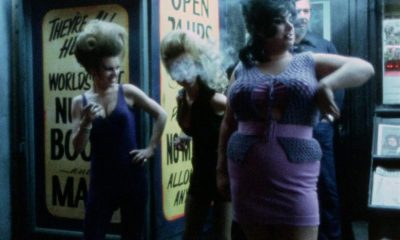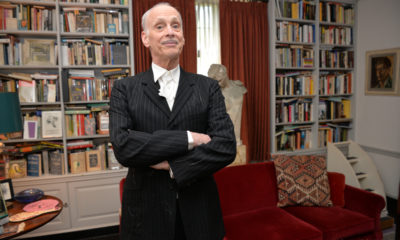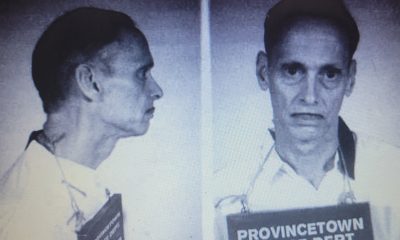Movies
Tab today
Hunky ’50s actor on Divine, Tallulah and more
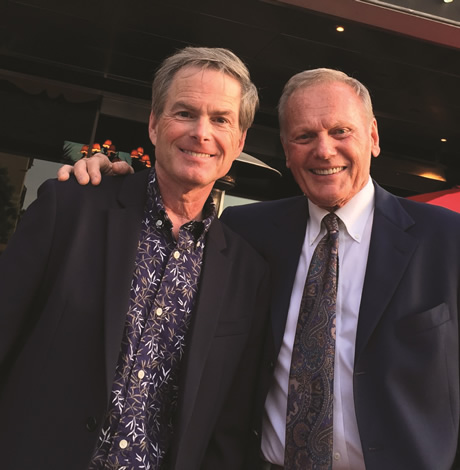
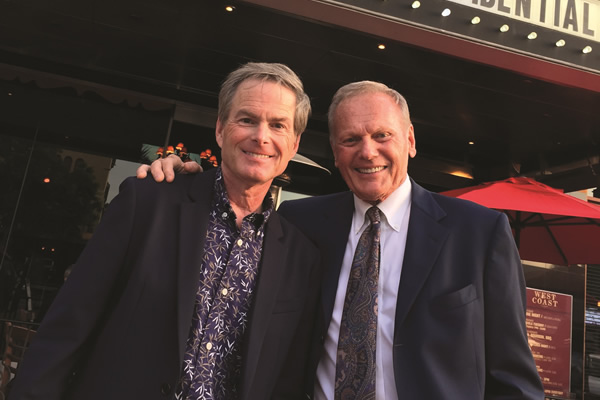
Tab Hunter, on right, credits his partner Allan Glaser, on left, with bringing his life story to the screen. (Photo courtesy the Film Collaborative)
‘Tab Hunter Confidential’
Oct. 23-29
Friday, Oct. 23 at 4 p.m.
Saturday, Oct. 24 at 5:30 p.m.
At age 84, openly gay actor Tab Hunter still has the boyish good looks, easy charm and buoyant optimism that made him one of Hollywood’s leading heartthrobs in the 1950s. He’s happy to be back in the spotlight with the release of the new documentary “Tab Hunter Confidential,” based on his 2006 memoir.
Hunter credits his long-time partner, Hollywood producer Allan Glaser, with getting him to write the memoir. Hunter remembers, “Allan said, ‘I think you should write a book,’ and I said, ‘Who would read a book about me?’ Allan said, ‘You’d be surprised.’ So I thought about it long and hard. I finally figured they may as well get it from the horse’s mouth and not from some horse’s ass after I’m dead and gone.”
In the book, Hunter confirmed decades-old rumors about his sexuality, including his relationship with Anthony Perkins. Looking back at their relationship, Hunter remembers that Perkins was different than his screen persona.
“Tony Perkins had a reputation for being very broody,” Hunter recalls. “Broody was very big in Hollywood at that time. And he was very moody, but he was also very intelligent with a quick sense of humor.” They were involved with each other for three years, but drifted apart after Hunter suspected that Perkins stole a plum role from him.
Hunter’s memoir was a big hit and Allan started work on a film documentary version. Hunter is proud of his partner’s work on the film. “Allan worked really hard putting it together,” he says. “The producer is the person who causes it all to happen. He raised all the money, hired the director, got all the interviews and stills. It took him six years to do it.”
“Tab Hunter Confidential” will be bringing Hunter to the D.C. area this week. The film opens tonight (Friday, Oct. 23) at the Angelika Pop-Up at Union Market and Hunter will be there in person on Sunday, Oct. 25. The film will also be part of the Middleburg (Virgina) Film Festival this weekend and Hunter is looking forward to being back in Virginia. “I am so looking forward to that. I used to have a farm out there. That’s heaven on earth, one of my favorite places in the world,” he says. “Sheila’s done a great job with that festival.”
The teen idol and gay role model was born Arthur Andrew Kelm in New York City in 1931. After brief stints in the Coast Guard (he was discharged for lying about his age) and at a riding academy (he’s had a life-long love of horses), the fledgling actor got an introduction to famous Hollywood agent Henry Willson. Willson renamed him, saying that he wanted to “tab” him with a catchy new name. “Hunter” came from his skills as a horseman who rode hunters and jumpers.
Hunter wryly remembers that Willson originally wanted him to change his name to “Troy Donahue.” He scoffs, “Can you believe that Henry Willson wanted to stick that name on me?” Ironically, the name later want to another New York native named Merle Johnson who succeeded Hunter as Hollywood’s leading heartthrob.
The newly minted Hunter was quickly snatched up by the legendary Jack Warner at Warner Brothers. Despite rumors about his sexuality, Hunter quickly became a star. From 1955 through 1959 he was the top grossing star for Warner Brothers and his chart-topping singles also helped to launch the Warner Brothers Records label.
As the new documentary details, Hunter grew frustrated by his restrictive deal with Warner Brothers and he bought out his contract with the studio. Unfortunately, without the protection of the studio’s press office, and with the rise of new heartthrob Troy Donahue, Hunter slid into infamy and then obscurity. He starred on Broadway with his friend Tallulah Bankhead in Tennessee Williams’ “The Milk Train Doesn’t Stop Here Anymore,” but the show only lasted five performances. Hunter also worked in dinner theaters across the country as well as appearing as a guest star in numerous television shows and acting in a number of B-movies. Things changed in 1981 when he got a call from trashy film director John Waters.
“John called me when I was doing a play in Indianapolis,” Hunter says. “He asked if I knew who he was and I said I was a big fan. I loved ‘Mondo Trasho’ and ‘Pink Flamingos.’ And then he said, ‘Before we go any further, how would you feel about kissing a 350-pound transvestite?’ I said, ‘Well, I’ve kissed a hell of a lot worse.’”
With that, Hunter was cast in the cult hit “Polyester” and sprang back into the public spotlight. He was only on the set for a week (that’s all Waters could afford), but Hunter still has fond memories of that shoot and his plus-size co-star, Divine. “John is such a great character,” Hunter says. “He’s like a friendly undertaker. He’s one of the sweetest people in the world with his little Adolphe Menjou mustache. He’s so creative. He is just wonderful. So was Divine. That was a lot of fun.”
Hunter’s appearance in “Polyester” also led to his meeting with his partner of 30-plus years. “I originally met Allan at the studios at Twentieth Century Fox,” Hunter says. “I brought him a project I’d been working on called ‘The Reverend and Rosie.’ He liked the idea. It was his idea to change the title to ‘Lust in the Dust’ and to bring in Divine and Lainie Kazan. The only sad thing is that we didn’t get John Waters to direct, but we sure tried.”
Nowadays, Hunter spends most of his time on his beloved Santa Barbara ranch with Allan and his horses, but he’s enjoying promoting the documentary and meeting fans old and new.
“I was an old man just out at the barn every day with my horses shoveling out the real stuff,” he says. “But they’re really keeping me busy with the documentary. I’m just overwhelmed by the response.”
Movies
20 years later, we still can’t quit ‘Brokeback Mountain’
Iconic love story returns to theaters and it’s better than you remember

When “Brokeback Mountain” was released in 2005, the world was a very different place.
Now, as it returns to the big screen (beginning June 20) in celebration of its 20th anniversary, it’s impossible not to look at it with a different pair of eyes. Since its release, marriage equality has become the law of the land; queer visibility has gained enough ground in our popular culture to allow for diverse queer stories to be told; openly queer actors are cast in blockbuster movies and ‘must-see’ TV, sometimes even playing queer characters. Yet, at the same time, the world in which the movie’s two “star-crossed” lovers live – a rural, unflinchingly conservative America that has neither place nor tolerance for any kind of love outside the conventional norm – once felt like a place that most of us wanted to believe was long gone; now, in a cultural atmosphere of resurgent, Trump-amplified stigma around all things diverse, it feels uncomfortably like a vision of things to come.
For those who have not yet seen it (and yes, there are many, but we’re not judging), it’s the epic-but-intimate tale of two down-on-their-luck cowboys – Ennis Del Mar (Heath Ledger) and Jack Twist (Jake Gyllenhall) – who, in 1963 Wyoming, take a job herding sheep on the titular mountain. There’s an unmistakable spark between them, and during their months-long shared isolation in the beautiful-but-harsh wilderness, they become lovers. They part ways when the job ends and go on about their lives; Ennis resolutely settles into a hardscrabble life with a wife (Michelle Williams) and kids, while Jack struggles to make ends meet as a rodeo rider until eventually marrying the daughter (Anne Hathaway) of a wealthy Texas businessman. Yet even as they struggle to maintain their separate lives, they reconnect, escaping together for “fishing trips” to continue their forbidden affair across two decades, even as the inevitable pressures and consequences of living a double life begin to take their toll.
Adapted from a novella by Annie Proulx, (in an Oscar-winning screenplay by co-producer Diana Ossana and acclaimed novelist Larry McMurtry), and helmed by gifted Taiwanese filmmaker Ang Lee (also an Oscar winner), the acclaim it earned two decades ago seems as well-deserved as ever, if not more so. With Lee bringing an “outsider’s eye” to both its neo-western setting and its distinctly American story of stolen romance and cultural repression, “Brokeback” maintains an observational distance, uninfluenced by cultural assumptions, political narratives, or traditional biases. We experience Ennis and Jack’s relationship on their terms, with the purely visceral urgency of instinct; there are no labels, neither of them identifies as “queer” – in fact, they both deny it, though we know it’s likely a feint – nor do they ever mention words like “acceptance, “equality,” or “pride.” Indeed, they have no real vocabulary to describe what they are to each other, only a feeling they dare not name but cannot deny.
In the sweeping, pastoral, elegiac lens of Lee’s perceptive vision, that feeling becomes palpable. It informs everything that happens between them, and extends beyond them to impact the lives they are forced to maintain apart from each other. It’s a feeling that’s frequently tormented, sometimes violent, and always passionate; and while they never speak the word to each other, the movie’s famous advertising tagline defines it well enough: “Love is a force of nature.”
Yet to call “Brokeback” a love story is to ignore its shadow side, which is essential to its lasting power. Just as we see love flowing through the events and relationships we observe, we also witness the resistant force that opposes it, working in the shadows and twisting it against itself, compelling these men to hide themselves in fear and shame behind the presumed safety of heterosexual marriage, wreaking emotional devastation on their wives, and eventually driving a wedge between them that will bring their story to (spoiler alert, if one is required for a 20-year-old film) a heartbreaking conclusion.
That opposing force, of course, is homophobia, and it’s the hidden – though far from invisible – villain of the story. Just as with Romeo and Juliet, it’s not love that creates the problem; it’s hate.
As for that ending, it’s undeniably a downer, and there are many gay men who have resisted watching the movie for all these years precisely because they fear its famously tragic outcome will hit a little too close to home. We can’t say we blame them.
For those who can take it, however, it’s a film of incandescent beauty, rendered not just through the breathtaking visual splendor of Rodrigo Prieto’s cinematography, but through the synthesis of all its elements – especially the deceptively terse screenplay, which reveals vast chasms of feeling in the gaps between its homespun words, and the effectiveness of its cast in delivering it to performance. Doubtless the closeness between most of its principal players was a factor in their chemistry – Ledger and Gyllenhall were already friends, and Ledger and Williams began a romantic relationship during filming which would lead to the birth of their daughter, just before the movie’s premiere. Both Williams and Hathaway remain grounded in the truth of their characters, each of them earning our empathy and driving home the point that they are victims of homophobia, too.
As for the two stars, their chemistry is deservedly legendary. Ledger’s tightly strung, barely-articulate Ennis is a masterclass in “method” acting for the screen, with Gyllenhall’s brighter, more open-hearted Jack serving in perfectly balanced contrast. They are yin and yang to each other, and when they finally consummate their desires in that infamous and visceral tent scene, what we remember is the intensity of their passion, not the prurient details of their coupling – which are, in truth, more suggested than shown. Later, when growing comfort allows them to be tender with each other, it feels just as authentic. Both actors were outspoken allies, and though neither identified as gay or bisexual, their comfort and openness to the emotional (as well as physical) authenticity of the love story they were cast to play is evident in every moment they spend on the screen. It’s impossible to think of the movie being more perfect with anyone else but them.
As iconic as its starring pair have become, however, what made “Brokeback” a milestone was the challenge it threw in the face of accepted Hollywood norms, simply by telling a sympathetic story about same-sex love without judgment, stereotype, identity politics, or any agenda beyond simple humanistic compassion. It was the most critically acclaimed film of the year, and one of the most financially successful; though it lost the Oscar for Best Picture (to “Crash,” widely regarded as one of the Academy’s most egregious errors), it hardly mattered. The precedent had been set, the gates had been opened, and the history of queer cinema in mainstream Hollywood was forevermore divided into two eras – before and after “Brokeback Mountain.”
Still, its “importance” is not really the reason to revisit it all these years later. The reason is that, two decades later, it’s still a beautiful, deeply felt and emotionally resonant piece of cinema, and no matter how good you thought it was the first time, it’s even better than you remember it.
It’s just that kind of movie.

There was a time, early in his career, that young filmmaker Wes Anderson’s work was labeled “quirky.”
To describe his blend of dry humor, deadpan whimsy, and unresolved yearning, along with his flights of theatrical fancy and obsessive attention to detail, it seemed apt at the time. His first films were part of a wave when “quirky” was almost a genre unto itself, constituting a handy-but-undefinable marketing label that inevitably became a dismissive synonym for “played out.”
That, of course, is why every new Wes Anderson film can be expected to elicit criticism simply for being a Wes Anderson film, and the latest entry to his cinematic canon is, predictably, no exception.
“The Phoenician Scheme” – released nationwide on June 6 – is perhaps Anderson’s most “Anderson-y” movie yet. Set in the exact middle of the 20th Century, it’s the tall-tale-ish saga of Anatole “Zsa-Zsa” Korda (Benicio del Toro), a casually amoral arms dealer and business tycoon with a history of surviving assassination attempts. The latest – a bomb-facilitated plane crash – has forced him to recognize that his luck will eventually run out, and he decides to protect his financial empire by turning it over (on a trial basis, at least) to his estranged daughter Liesl (Mia Threapleton), currently a novice nun on the verge of taking her vows. She conditionally agrees, despite the rumors that he murdered her mother, and is drawn into an elaborate geopolitical con game in which he tries to manipulate a loose cadre of “world-building” financiers (Tom Hanks, Bryan Cranston, Riz Ahmed, Mathieu Amalric, and Jeffrey Wright) into funding a massive infrastructure project – already under construction – across the former Phoenician empire.
Joined by his new administrative assistant and tutor, Bjorn (Michael Cera), Korda and Liesl travel the world to meet with his would-be investors, dodging assassination attempts along the way. His plot is disrupted, however, by the clandestine interference of a secret coalition of nations led by an American agent code-named “Excalibur” (Rupert Friend), who seeks to prevent the shift of geopolitical power his project would create. Eventually, he’s forced to target a final “mark” – his ruthless half-brother Nubar (Benedict Cumberbatch), with whom he has played a lifelong game of “who can lick who” – for the money he needs to pull it off, or he’ll lose his fortune, his oligarchic empire, and his slowly improving relationship with his daughter, all at once.
It’s clear from that synopsis that Anderson’s scope has widened far beyond the intimate stories of his earliest works – “Bottle Rocket,” “Rushmore,” “The Royal Tenenbaums,” and others, which mostly dealt with relationships and dynamics among family (or chosen family) – to encompass significantly larger themes. So, too, has his own singular flavor of filmmaking become more fully realized; his exploration of theatrical techniques within a cinematic setting has grown from the inclusion of a few comical set-pieces to a full-blown translation of the real world into a kind of living, efficiently-modular Bauhaus diorama, where the artifice is emphasized rather than suggested, and realism can only be found through the director’s unconventionally-adjusted focus.
His work is no longer “quirky” – instead, it has grown with him to become something more pithy, an extension of the surreal and absurdist art movements that exploded in the tense days before World War II (an era which bears a far-too-uncomfortable resemblance to our own) and expresses the kind of politically-aware philosophical ideas that helped to build the world which has come since. It is no longer possible to enjoy a Wes Anderson movie on the basis of its surface value alone; it is necessary to read deeper into his now-well-honed cinematic language, which is informed not just by his signature aesthetic but by intellectual curiosity, and by the art, history, and cultural knowledge with which he saturates his work – like pieces of a scattered puzzle, waiting to be picked up and assembled along the way. Like all auteurs, he makes films that are shaped by a personal vision and follow a personal logic; and while he may strive to make them entertaining, he is perhaps more interested in providing insight into the wildly contradictory, often nonsensical, frequently horrifying, and almost always deplorable behavior of human beings. Indeed, the prologue scene in his latest endeavor illustrates each of those things, shockingly and definitively, before the opening credits even begin.
By typical standards, the performances in “Phoenician Scheme” – like those in most of Anderson’s films – feel stylized, distant, even emotionally cold. But within his meticulously stoic milieu, they are infused with a subtle depth that comes as much from the carefully maintained blankness of their delivery as it does from the lines themselves. Both del Toro and Threapleton manage to forge a deeply affecting bond while maintaining the detachment that is part of the director’s established style, and Cera – whose character reveals himself to be more than he appears as part of the story’s progression – begs the question of why he hasn’t become a “Wes Anderson regular” long before this. As always, part of the fun comes from the appearances of so many familiar faces, actors who have become part of an ever-expanding collection of regular players – including most-frequent collaborator Bill Murray, who joins fellow Anderson troupers Willem Dafoe and F. Murray Abraham as part of the “Biblical Troupe” that enact the frequent “near-death” episodes experienced by del Toro’s Korda throughout, and Scarlett Johansson, who shows up as a second cousin that Korda courts for a marriage of financial convenience – and the obvious commitment they bring to the project beside the rest of the cast.
But no Anderson film is really about the acting, though it’s an integral part of what makes them work – as this one does, magnificently, from the intricately choreographed opening credit sequence to the explosive climax atop an elaborate mechanical model of Korda’s dream project. In the end, it’s Anderson himself who is the star, orchestrating his thoroughly-catalogued vision like a clockwork puzzle until it pays off on a note of surprisingly un-bittersweet hope which reminds us that the importance of family and personal bonds is, in fact, still at the core of his ethos.
That said, and a mostly favorable critical response aside, there are numerous critics and self-identified fans who have been less than charmed by Anderson’s latest opus, finding it a redundant exercise in a style that has grown stale and offers little substance in exchange. Frankly, it’s impossible not to wonder if they have seen the same movie we have.
“The Phoenician Scheme,” like all of its creator’s work, is ultimately an esoteric experience, a film steeped in language and concepts that may only be accessible to those familiar with them – which, far from being a means of shutting out the “unenlightened,” aims instead to entice and encourage them to think, to explore, and, perhaps, to expand their perspective. It might be frustrating, but the payoff is worth it.
In this case, the shrewd political and economical realities he illuminates behind the romanticized “Hollywood” intrigue and his deceptively eccentric presentation speak so profoundly to the current state of world we live in that, despite its lack of directly queer subject matter, we’re giving it our deepest recommendation.
Movies
Queer movies and shows to watch this summer
‘Brokeback’ returns, a Sally Ride doc, and much more
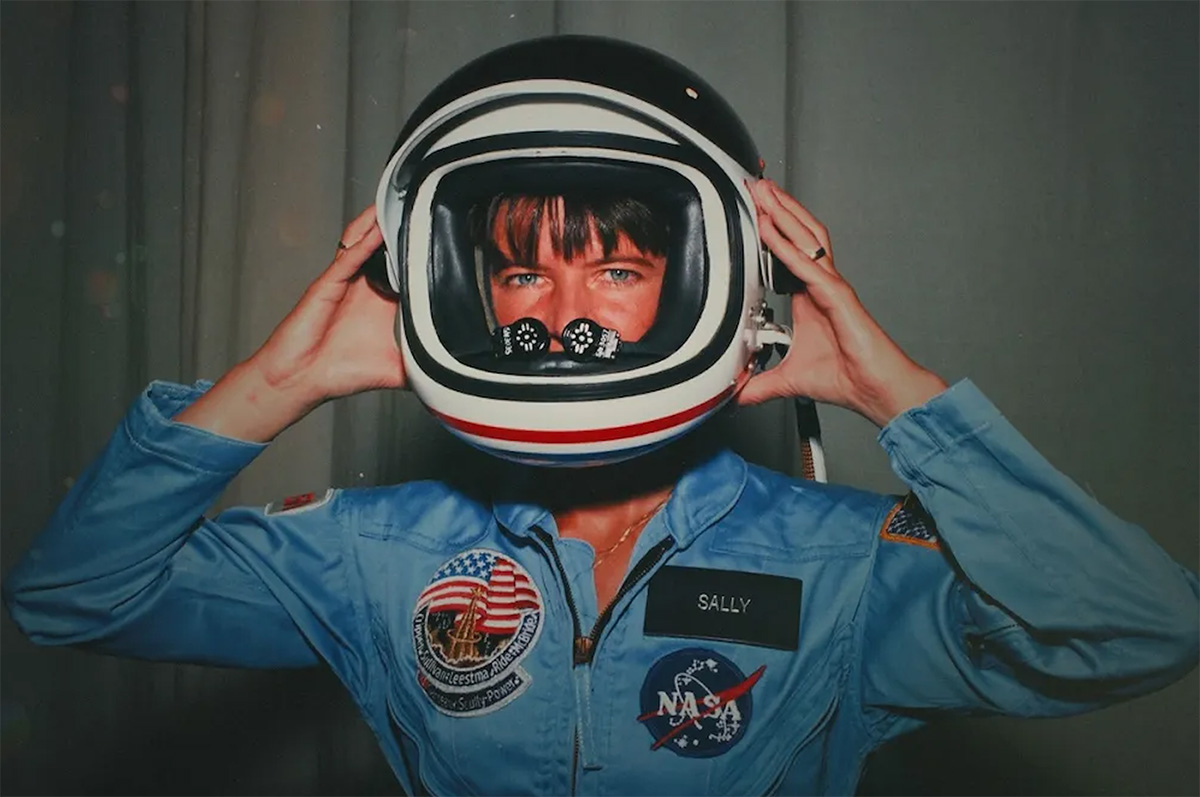
Summer is upon us, and so is Pride month, which means a whole crop of queer-flavored movies and shows are ready to blossom onto our nearest screen over the next few weeks; and as always, the Blade is here with a handy guide to help you fill out your watchlist.
I Don’t Understand You
First up is this pitch-black horror comedy starring Nick Kroll and Andrew Rannells as a gay American couple (and soon-to-be-adoptive-daddies) celebrating their 10th anniversary with a trip to Italy. Unfortunately, neither of them speaks Italian, and the resulting language barrier creates a series of mishaps and misunderstandings that turns their dream vacation into a farcical traveler’s nightmare. Co-created by real-life gay couple Brian Crano and David Joseph Craig (who also directed), it’s got an authentic queer voice behind it, and a pair of talented and funny lead actors to make it work; it’s also got a nice collection of good reviews behind it from its debut at 2024’s SXSW and other festivals, which makes it a strong opener for your summertime slate. 6/6, in theaters
Loulou
Directed by Noëlle P. Soulier, this thoughtful trans coming-of-age/coming-out story centers on a closeted 17-year-old teen (Kevin Curtis) struggling with her identity while trying to cope with harassment at school and the pressure of living with her strict Catholic parents (Desean Terry and Reiko Aylesworth). Pushed to the church, she finds unexpected solace, encouraging her to start a journey toward self-acceptance – something that includes a new relationship with her own ex-bully (Spencer Belko), who has been struggling with some identity issues of his own. Also starring Patrika Darbo as a sympathetic nun, this gentle story about trans experience seems like a welcome beacon of support at a time when we really need one. 6/6, VOD
Sally
Directed and produced by Cristina Costantini, this documentary from National Geographic explores the life and career of Sally Ride, who became the first American woman to blast off into space. It’s not just the story of her historic achievement, however, but the story of her 27-year romance and relationship with life partner, Tam O’Shaughnessy, who reveals the full personal journey of America’s LGBTQ astronaut for the very first time. 6/16, NatGeo; 6/17, Hulu, Disney+
Brokeback Mountain
No, that’s not a misprint and you’re not having a flashback to 2005, because the game-changing Ang Lee-directed drama about two cowboys in love is returning to theaters for a series of special screenings to celebrate its 20th anniversary. If you’re anything like us, you probably “wish you could quit” this powerful, heartbreaking, and tragically beautiful masterpiece – but we all know we never will. Why not celebrate that special bond by seeing it again on the big screen? Beginning 6/20, in theaters
The Gilded Age (Season 3)
Back for another round of sumptuously costumed, lavishly decorated intrigue among the ostentatiously wealthy high society class of late 19th-century New York (and those entangled in their world), the newest installment of this intrinsically queer period soap opera finds a definite shift in dynamics taking place after last season left the major players of the “old guard” weakened and the social-climbing “new money” crowd poised to take their place at the top of the pecking order. Promising the return of its sprawling cast – which includes queer fan favorites like Christine Baranski, Cynthia Nixon, Carrie Coon, Nathan Lane, and more, not to mention an ever-expanding host of Broadway greats to fill out the supporting cast and guest star roster – as well as the savvy perspective of show creator Julian Fellowes (“Downton Abbey,” which also returns later this year for a swan song on the big screen) to ensure its status as both artful social observation and “guilty pleasure” escapism, it’s probably already on your list if you’re a fan. If you’re not, there’s still time to catch up with the first two seasons before this one drops. 6/22, HBO Max
King of Drag
Move over, RuPaul, because the first major Drag King competition series is making its debut on queer streaming service Revry, where it plans on “serving you bold, brilliant, and unapologetic talent like never before” and celebrating “masculinity in all its forms.” Hosted by legendary trans New York drag king Murray Hill, it will feature regular judges Gottmik, Sasha Velour, Tenderoni, Wang Newton, and Revry co-founder Damian Pelliccione, as well as a list of guest judges that includes Jackie Beat, Cole Escola, Landon Cider, Lisa Rinna, and more. 6/22, Revry
Ironheart
Queer Marvel fans will certainly be on board for this new miniseries from the MCU, which is set after the events of the film “Black Panther: Wakanda Forever” and follows young genius inventor Riri Williams (Dominique Thorne) as she embraces her evolution into the titular superhero in her hometown of Chicago. Reportedly establishing the lead character as bisexual, the series (created by Chinaka Hodge) also continues the Marvel franchise’s efforts toward diversity and inclusion with the introduction of a transgender character and the casting of transmasculine actor Zoe Terakes and “Drag Race” star Shea Couleé in supporting roles. “Hamilton” and “In the Heights” star Anthony Ramos co-stars as Parker Robbins (aka “The Hood”). 6/24, Disney+
The Ultimatum: Queer Love (Season 2)
For fans of reality TV competition, this popular show – a spin-off from “The Ultimatum: Marry or Move On” – returns with a set of six new couples (made up of women and non-binary people), who must put their love to the test by moving in with other partners to determine if they’re ready for marriage — or simply ready for someone else. 6/25, Netflix
Hot Milk
Adapted from the 2016 novel by Deborah Levy, this coming-of-age drama from filmmaker Rebecca Lenkiewicz follows Sofia (Emma Mackey) as she accompanies her domineering, wheelchair-bound mother (Fiona Shaw) to a questionable clinic in Spain in search of treatment, and is tempted by a tantalizing new life in the form of a local seamstress (Vicky Krieps). With a literary pedigree to balance its air of soft-core steaminess, this one appeals to us on the basis of its captivating cast alone. 6/27, limited theaters
M3GAN 2.0
The hot movie ticket this summer is likely to be for this sequel to 2022’s campy comedic cult horror hit, in which a murderous rogue AI-powered doll goes on a rampage after becoming self-aware before being destroyed – or at least, apparently. Three years later, M3GAN’s creator (Allison Williams) is now an advocate for oversight on Artificial Intelligence, but when a new and deadly android (Ivanna Sakhno) is created as a military weapon from her stolen plans, she must risk resurrecting her original invention in order to stop an even greater threat to humanity. Violet McGraw returns as Williams’ now-teenaged niece, as do Amie Donald and Jenna Davis as the title character’s body and voice, respectively. 6/27, in theaters
Ponyboi
Highly anticipated is this neo-noir thriller from director Esteban Arango, written by and starring intersex actor, filmmaker, and activist River Gallo, which is finally getting a theatrical release nearly a year and a half after its acclaimed debut at the 2024 Sundance Festival. Adapted and expanded from a 2019 short film by Gallo, it follows a young intersex sex worker (Gallo), whose messy personal life – his best friend (Victoria Pedretti) is pregnant, and the father is his own pimp/boyfriend (Dylan O’Brien) – gets even messier when a drug deal gone bad puts him on the run from the mob. Gallo’s performance has earned copious praise, and the fact that it’s a whole movie centered on an intersex person – surely a rarity, if not a first, in commercial American filmmaking – makes it even more of a must-see. 6/27, in theaters
Sorry, Baby
Another Sundance favorite makes its way to theaters in the form of this dark comedy-drama from first-time writer/director/star Eva Victor, who plays Agnes, a woman still recovering from a sexual assault by a trusted figure in her past, who has tried to move on but realizes how “stuck” she still is after a close friend makes a milestone announcement. Despite the heavy subject matter, it’s earned its acclaim – and the resultant buzz that enticed top flight distributor A24 to snap up the rights – by approaching it with a hefty dose of absurdist humor, as it peels back the onion of the “bad thing” that happened to finally set Agnes on a course toward healing through a series of five “chapters” in her life. It’s been described as a “trauma-dy” – and frankly, we think that’s enough to make it irresistible. 6/27, in theaters
Freakier Friday
You might be tempted to say this is the sequel that nobody asked for – but you know you’re going to be there for it. The perennial parent/child identity swap franchise (spawned by a sharp-witted novel from Broadway royalty Mary Rodgers) reinvents itself yet again with the return of Jamie Lee Curtis and Lindsay Lohan as a mother and daughter who, decades after having swapped bodies due to a mystical incident involving a fortune cookie, find themselves once again switching places on the eve of a milestone wedding. We have no idea if there’s any queer-relevant story elements here; we just know most of us will be fully on board, if only for the nostalgia and the undying appeal of its queer-fan favorite stars. 8/8, in theaters
Lurker
Touted as “a screw-turning psychological thriller made for the moment” and directed by Alex Russell (writer/producer of the acclaimed shows “The Bear” and “Beef”), this dark pop cultural commentary focuses on a young LA loner (Théodore Pellerin) who has a chance encounter with a rising pop star (Archie Madekwe) and uses it to infiltrate his “entourage” – only to find himself caught up in an ever-escalating competition for attention, access, and proximity to “fame” that soon becomes “a matter of life and death.” A buzzy, paranoid, and grimly exhilarating exploration of the music industry, fandom, and “our universal search for validation,” this creepy but enticing suspenser scores extra points from us for leaning into a homoerotic subtext and serving up the sweaty wrestling scenes to prove it. 8/22, in theaters
Honey Don’t!
The second of a planned “Lesbian B-Movie Trilogy” from filmmaker Ethan Coen and his wife Tricia Cooke (which began with last year’s “Drive Away Dolls”), this neo-noir-ish dark comedy stars Margaret Qualley (“The Substance”) as a lesbian private eye who is led by a case into a series of strange deaths centered around a mysterious church. It’s the kind of movie for which the less you know about it, the better it probably plays, so we won’t say much more – except that its cast includes heavyweights Aubrey Plaza, Billy Eichner, and Chris Evans. We say, “honey, DO.” 8/22, in theaters
Twinless
Coming on the cusp of fall, filmmaker James Sweeney’s eagerly awaited black comedy (do we detect a common thread in this summer’s selection, or is it just us?) is yet another Sundance darling, bolstered even further by the controversial gay sex scenes that were leaked online by fans of teen-heartthrob-turned-A-lister Dylan O’Brien (playing gay again for his second appearance on our list), who co-stars with Sweeney himself in this oddball story about two young queer men who meet in a support group for bereaved twins and form a sexually intense friendship with each other. Praised by critics for its “seamless” integration of queer themes into a compelling (if unusual) narrative, there’s been a lot of delay and reshuffled plans around its official release date – but now it’s officially set to be our final treat for a summer full of queer entertainment. 9/5, in theaters

